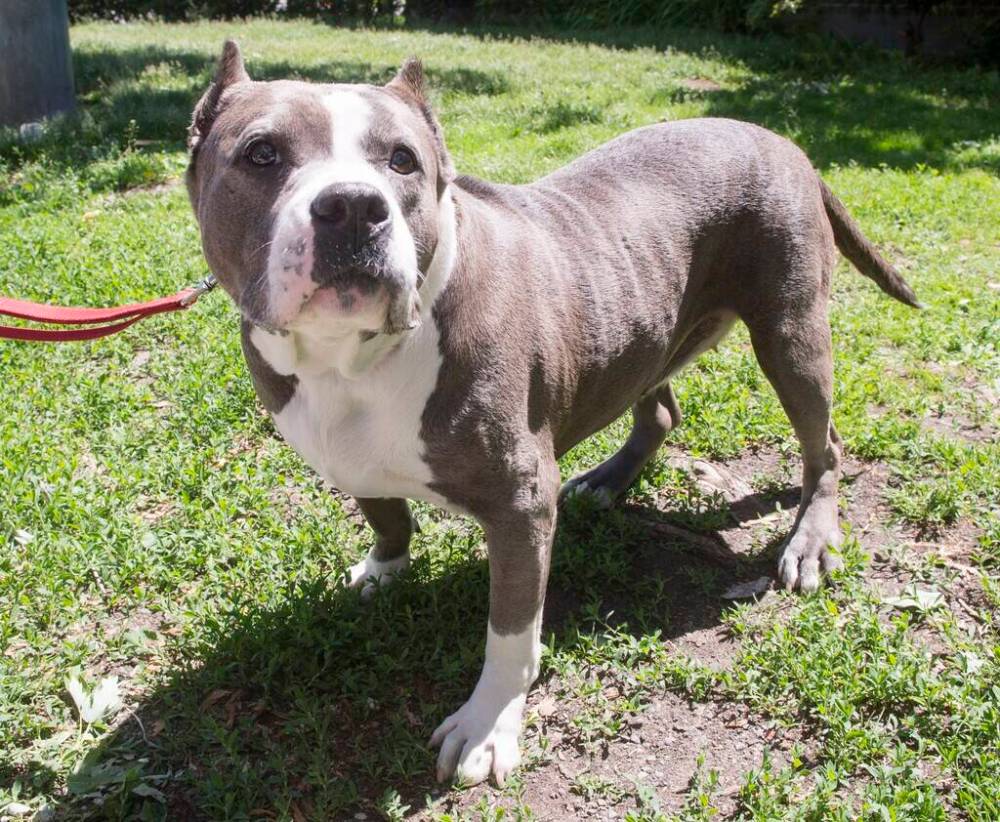City’s ban on pit bulls remains after 9-7 council vote
Advertisement
Read this article for free:
or
Already have an account? Log in here »
To continue reading, please subscribe:
Monthly Digital Subscription
$0 for the first 4 weeks*
- Enjoy unlimited reading on winnipegfreepress.com
- Read the E-Edition, our digital replica newspaper
- Access News Break, our award-winning app
- Play interactive puzzles
*No charge for 4 weeks then price increases to the regular rate of $19.00 plus GST every four weeks. Offer available to new and qualified returning subscribers only. Cancel any time.
Monthly Digital Subscription
$4.75/week*
- Enjoy unlimited reading on winnipegfreepress.com
- Read the E-Edition, our digital replica newspaper
- Access News Break, our award-winning app
- Play interactive puzzles
*Billed as $19 plus GST every four weeks. Cancel any time.
To continue reading, please subscribe:
Add Free Press access to your Brandon Sun subscription for only an additional
$1 for the first 4 weeks*
*Your next subscription payment will increase by $1.00 and you will be charged $16.99 plus GST for four weeks. After four weeks, your payment will increase to $23.99 plus GST every four weeks.
Read unlimited articles for free today:
or
Already have an account? Log in here »
Hey there, time traveller!
This article was published 29/04/2022 (1323 days ago), so information in it may no longer be current.
There will not be any changes to Winnipeg’s ban on pit bulls after a narrow council vote that rejected a call to end the controversial rule.
In a 9-7 vote late Thursday, a slim majority of councillors opted to keep the ban in place on owning specific breeds of dogs. Since 1990, American pit bull terriers, American Staffordshire terriers, Staffordshire bull terriers, and predominant mixes of those breeds, have not been allowed as pets in the city.
Prior to the vote, Mayor Brian Bowman told reporters he would not support the change.

“(The ban) was brought in after a vicious attack on one of our residents and I, for one, don’t want to be responsible for increasing the number of pit bulls in the City of Winnipeg,” said Bowman.
“A bite from a pit bull is very different than a chihuahua.… Dogs do bite, but the bite from a pit bull can be deadly.”
The mayor joined councillors Jeff Browaty, Scott Gillingham, Kevin Klein, Janice Lukes, Brian Mayes, John Orlikow, Jason Schreyer and Devi Sharma in voting to keep the ban. Councillors Markus Chambers, Shawn Nason, Cindy Gilroy, Sherri Rollins, Ross Eadie, Vivian Santos and Matt Allard voted to end it.
As the head of council’s protection, community services and parks committee, Rollins said she participated in a few appeals of dangerous-dog designations that made it clear some people still owned the banned pets in Winnipeg.
“It’s always been true that a ban hasn’t prevented (these dogs) from being in the city,” Rollins told the Free Press.
A call to eliminate the ban was included in a set of proposed changes to the Responsible Pet Ownership By-law.
Council also approved new rules for owners of at-risk and dangerous dogs. Rollins said those changes should help shift the focus from breed to behaviour and improve safety. Winnipeg Animal Services said the vast majority of city residents supported a “breed-neutral approach” on dogs during public consultations.
The at-risk dog focus will identify owners the city can work with to help prevent their animals from being declared dangerous.
Coun. Shawn Nason, who has long opposed the breed ban, said the fight to end it will continue.
“I thought we had enough (votes) to remove this discriminatory ban but it sounded like the fear-mongering that was presented as part of the delegations and (by) some of those around the council table ruled the day,” said Nason.
The councillor said he expects advocates will continue to lobby against the ban, potentially at the provincial government level.
“We’re down today but we’ll dust ourselves off and we’ll move forward,” he said.
Nason noted all dogs can bite, so the city should not prejudge specific breeds.
Serious dog attacks in recent years have involved both banned and permitted breeds.
In 2020, four dogs were involved in a vicious attack outside the Capri Motel, leaving two people with life-altering injuries. At least three of the animals were American pit bull terriers.
And in 2021, a permitted Siberian husky fatally attacked two small dogs at a canine daycare — an animal the city later labelled a “dangerous dog.”
Meanwhile, council also rejected a proposed two-year pilot project that would have allowed backyard chickens, after hearing concerns that the program could worsen the spread of avian flu.
“The majority of councillors said it’s not the time, not the priority or plan for now. For me, it’s primarily due to avian flu (and)… animal-welfare considerations,” said Rollins.
Joyanne.pursaga@freepress.mb.ca
Twitter: @joyanne_pursaga

Born and raised in Winnipeg, Joyanne loves to tell the stories of this city, especially when politics is involved. Joyanne became the city hall reporter for the Winnipeg Free Press in early 2020.
Our newsroom depends on a growing audience of readers to power our journalism. If you are not a paid reader, please consider becoming a subscriber.
Our newsroom depends on its audience of readers to power our journalism. Thank you for your support.



